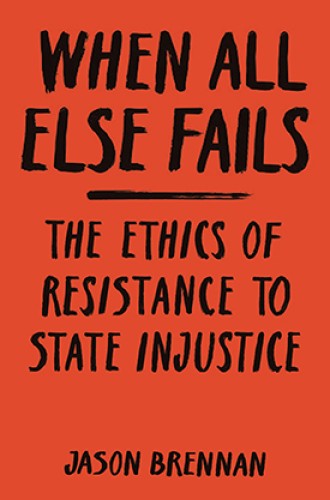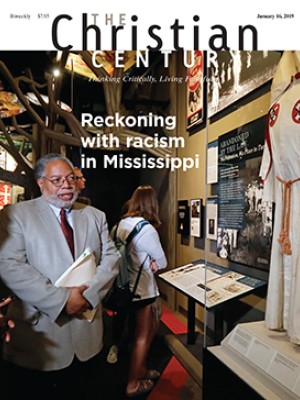Do Christians owe special respect to state authority?
Government enjoys no special immunity from moral judgment, argues Jason Brennan.
Jason Brennan is a professor of strategy, economics, ethics, and public policy at Georgetown University’s McDonough School of Business. That sprawling title does not clearly indicate a professional field or method. Brennan’s methodology, at least in this book, falls within the field of philosophy—not just any kind of philosophy, but a sometimes tedious and even irritating kind currently popular, in which philosophers develop endless thought experiments to clarify reasoning about propositions, questions, or cases.
The proposition that Brennan wants to explore in this volume is this:
You possess the same right of self-defense, and the same right to defend others, against government agents as you do against civilians. The moral principles governing self-defense against civilians and government agents, even agents who act by virtue of their appointed status and within the law, are the same.
Read our latest issue or browse back issues.
If Brennan is able to defend this proposition, he says, it will have “straightforwardly dangerous implications.” These include the right to defend oneself against excessive police violence, the right to evade arrest for crimes that should not be crimes, the right to sabotage unjust government actions, the right to lie to government agents when their actions merit it, the right of judges to misapply or ignore unjust laws, the right to resist unjust orders, and the right or even obligation to assist others who are being mistreated by government.
Essentially, concludes Brennan, whenever it might be right to defend oneself against or resist the unjust actions of a private citizen, it is also right to defend oneself against or resist the unjust actions of a representative of government. There is no morally significant distinction between the two situations because, according to Brennan, there is simple “moral parity” between a government representative and anyone else. Government is not magical; it does not enjoy any “special immunity” unavailable to others; it does not carry any special moral (or any other) authority or any particular legitimacy; it is not uniquely competent, trustworthy, or just; it does not have epistemic privilege in knowing what is just; and its commands and actions cannot trump general moral obligations incumbent upon ordinary people.
According to this thought world, if a police officer is spotted beating someone by the side of the road, we are free to shoot the officer. If a government bureaucrat issues an unjust order, we are free to sabotage or ignore it. If a government criminalizes marijuana and such criminalization is unjust, we are free to evade or block enforcement. If a president orders the nuclear bombing of an innocent country, we are free to resist and if necessary to act violently to prevent it. And so on.
Brennan signals something important very early in his book when he says, “we now see government agents as servants appointed by the people rather than as lords appointed by the gods.” He claims that philosophers deserve most of the credit for that shift in understanding.
At one level, he is just doing philosophy, working out thought experiments. At another level, he appears interested in a radical demystification of the authority of government. While he reminds readers that philosophers are “dangerous” and that he is not offering authoritative guidance for action, the result of his thought experiments lead to a complete stripping of any special authority for any representative of government. All those robes, badges, uniforms, guns, and laws add exactly zero moral authority to any human being’s actions. Any other idea appears to be, for Brennan, a vestige of a previous, less enlightened era.
This is a book worth reading even if one gets tired of thought experiments involving superheroes, evil wizards, ax murderers, or bad cops. It raises this question for Christians: What survives of the traditional Christian theology of government? Even if we have a robust ethic of resistance to government injustice, what is our stance toward respect for government authority? Are we prepared to accept a complete demystification of government?
The value of Brennan’s book is not that his thought experiment is entirely persuasive, but precisely that it stimulates fresh thinking about one of the oldest questions in Christian theology and ethics. It is a reminder that most of the development of Christian thinking about government took place in the contexts both of Christendom and a religiously mystified view of authoritarian rule. Few readers of this review would endorse a resurgence of either.
Perhaps the best remaining argument for a bit of special respect for government and its officials is government’s unique role in keeping order, delivering a modest amount of justice, and advancing the common good. Government is better than anarchy, except when it is worse.
We created government, we cannot do without it, and when it goes wrong we resist it until it gets better. It is not entirely credulous to see something of divine provision in it, a good gift that we are responsible for stewarding. A bit of deference to government, at least as our starting point, still makes sense—even if we are, quite rightly, long past the day when Christians viewed government officials as divine appointees meriting absolute obedience.






